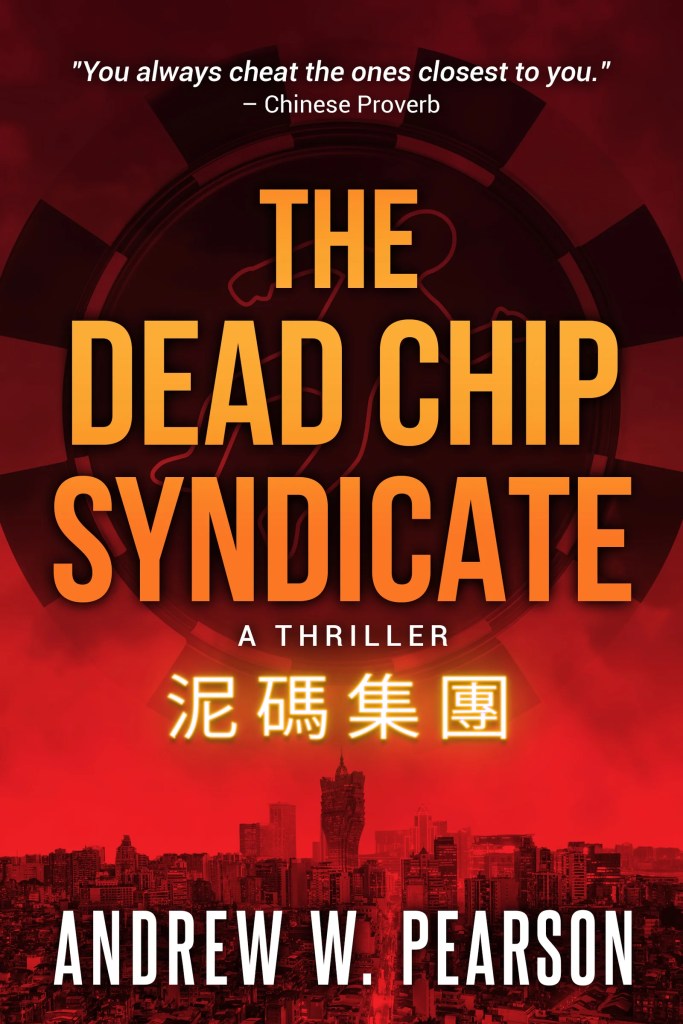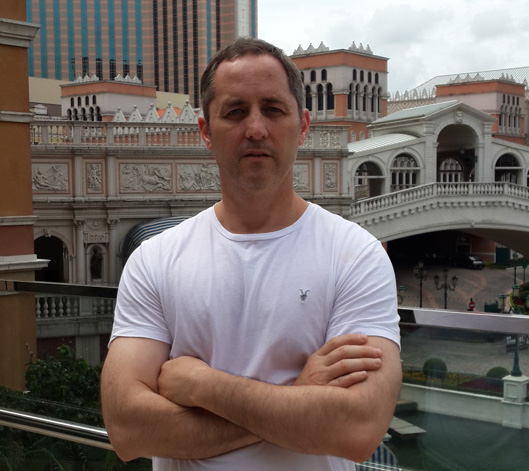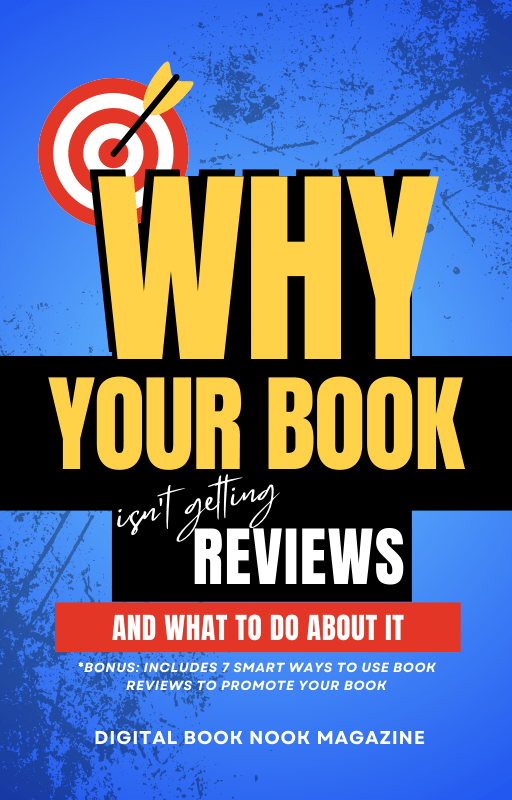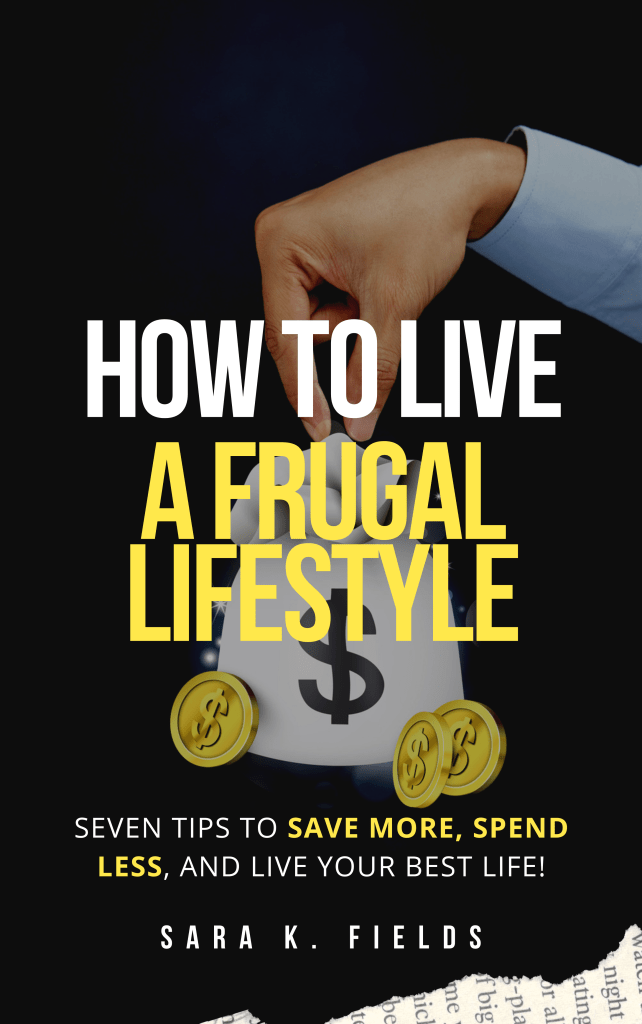Digital Book Nook recently caught up with Andrew W. Pearson, author of “The Dead Chip Syndicate.” We are excited to share this insightful interview with our readers today.
When did you first discover that you enjoy writing and wanted to become a published author?
When I was eleven, I was dropped off at boarding school in England. I was lucky enough to get a strong education in literature and arts at a young age and my writing was always recognized throughout high school. At 21, I moved to Los Angeles, where I attended UCLA. I teamed up with a film producer, optioned several novels, which I adapted into screenplays. Although I got directors attached to all my scripts, I wasn’t able to get any of them into production so I decided to cut out the middle writer and just write novels myself. Finding a great story was the difficult part, but once I landed in Macau and saw how crazy the place was, I knew I had to write a story centered here.
What is your favorite and the most challenging aspect of writing?
Researching the plot and creating the characters is the most interesting. Finding the time to write is the most frustrating and challenging. I run an AI and software consulting company in Macau and that takes a lot of my time, but it does give me a lot of insight into interesting technology that ends up in my book.
Tell us about your latest release.

In many ways, the book is autobiographical – except the attempted murder aspect, the money laundering, and all the criminality, or course – but the main character, Anthony Wilson, is, like me, a former screenwriter who lived in LA, struggled to get his work produced and then moved to Macau after receiving an enticing job offer from his twin brother. Whereas the events are fictional, Anthony’s voice is very much mine. The book is a thriller set in Macau based partially on my experience living in Macau and Asia. The synopsis is as follows: Offered the chance to run his twin brother’s A.I. company, Anthony Wilson ditches his failing screenwriting career to start anew in Macau. The job turns highly lucrative when Anthony’s new client, Cash Cheang, hands him a bag full of cold hard Yuan to implement a facial recognition system in his casino. Hearing about Anthony’s past life as a screenwriter, Cash offers him another job – ghostwriting a biography about the casino mogul’s life rising from the mean streets of Macau to becoming one of the city’s most successful businessmen. However, as Anthony learns more about Cash’s life, he realizes the biography is filled with dangerous secrets about the Chinese elite, secrets these powerful people would rather see buried for good. “You always cheat the ones closest to you”, warns an old Chinese proverb. Words that ring true as Anthony enters a playground more surreal and depraved than decadent Hollywood. More deadly too as Anthony soon discovers he’s the dupe in a huge Chinese money-laundering scheme that might be orchestrated by his treacherous twin.
How did you come up with the title of your book?
A Dead Chip is a real thing, it’s a casino chip that has no value except in one particular high roller or “junket” room as they call them in Macau. A gambler will deposit money with a junket operator in Shanghai and then pick up his dead chips in Macau. Anything he wins, when he plays with those chips on the tables in the junket rooms, gets paid out in normal casino chips. Those can be taken to the cage and cashed out and wired anywhere in the world. It’s a program that, if not handled carefully, can lead to easy money laundering. One of my main characters, Cash Cheang, runs one of these junket rooms so he is intimately involved with his own dead chip programs. It was the first title idea I came up. I tried “The Wild, Wild East” and “What Happens in Macau Never Happened” in earlier drafts, but The Dead Chip Syndicate seemed to fit better. It’s nice and mysterious and it’s alliterate, so it rolls off the tongue nicely. My publisher also preferred it.
What do you hope readers are able to get from reading your story?
A unique read. A satisfying conclusion. A hunger for more of my work (I’m writing the sequel now) And some laughter. Every thriller can do with a little levity. I found Macau–and many of the situations I write about in the book, which are based on real events–to be so ridiculous and funny I had to satirize them. Most readers should be entertained by these insights into another, truly foreign world. Few people can probably place Macau on a map, so seeing it through the eyes of an irreverent Westerner who is desperately trying to stay alive while chasing a fortune should be a great reading experience.
Who are some of your favorite authors?
Oscar Wilde, George Bernard Shaw, Elmore Leonard, Kurt Vonnegut, William Gibson, Mikhail Bulgakov, Nicholas Rinaldi, Lawrence Shames, Steve Lopez, and Robert Eversz. The last four are novelists whose work I optioned in the past so I did put my money where my mouth was.
Do you have any advice for writers looking to get published?
Develop a point of view. Kingsley Amis said, “If you can’t annoy somebody, there’s little point in writing.” The greatest writers knew the message they wanted to convey to their audience and then perfected their craft to tell stories in the best way to get the message through. Know what you’re talking about as well. Kurt Vonnegut advised writers to find a subject they cared about. My book delves into AI, crypto coins, and money laundering; all things I know quite a bit about because of my work. One reviewer commented my book got too technical and needed a glossary, but I think that was going a bit far. Although I delve into the technology, the story is still centered on a pair of twins and questions of greed, loyalty, and betrayal so some of the basest of instincts, so have a point of view but tell the story through related people, life-changing or life-threatening problems,
Be professional. Make sure your manuscript is as grammatically tight as possible. Hire a professional editor, but be particular. I was quite lucky in that a novelist I previously optioned, Robert Eversz, was a professor at UCLA Extension, teaching novel writing. It was like it was in the stars. I didn’t take his UCLA course because my novel was almost complete, but I hired him to edit the book. He did two passes and it was instrumental in getting the book into publishing shape. Having a second set of eyes, professional eyes, on your manuscript is priceless. Not only was he able to spot some plot issues, but he also had a few creative ideas that helped with the piece.
Try the agents (manuscriptwishlist.com is a good website to start at), but spread your wings. Go directly to the publishers. Even when I was working in the film business, I focused on finding the money, and courting the sales agents, distributors, and producers, rather than trying to get an agent on board to sell my script. Similarly, with book publishing, I’d advise writers to go to the source–the people who are actually publishing books. They know the market, and what’s selling. I found my publisher through Authorspublish.com. It’s a great resource.
Understand publishing is just the first step in your career as a writer. I’ve spent a lot of time marketing the book, almost becoming a PR agent for it. It’s amazing the amount of information available on the internet to help you market a book. I live in Macau, which is a pretty small place, so, using my contacts, I was able to get into the Macau Literary Festival, A piece on the book recently came out in a local magazine, so things like this help get the word out. Don’t be shy. Talk about your book to everyone who might be interested. You never know, you could help them fill a slot they need in their magazine or on their podcast.
Follow: Website | LinkedIn | Twitter | Instagram

ABOUT THE AUTHOR
Andrew Pearson is the author of several nonfiction books about analytics and AI as well as a noted columnist, who writes on topics like analytics, generative AI, social media, and cloud technology for such publications as The Journal of Mobile and Social Media Marketing, The Journal of Applied Marketing Analytics, and The Journal of AI, Robotics & Workplace Automation. In 2023, Pearson’s first novel, The Dead Chip Syndicate, was traditionally published by Brother Mockingbird. An avid traveler, Pearson is a sought-after speaker, lecturing on such disparate topics as AI, analytics, and digital marketing. If he’s not pounding the pavements of Hollywood, he’s probably meandering through the labyrinthine streets of Hong Kong’s Lang Kwai Fong, or tearing up useless betting slips at Happy Valley (perhaps the most perfectly named racecourse in the world (for some)), or dining at a hawker center in Singapore, or wandering through tall safari grasses in South Africa, or grabbing some lechon at a bustling outdoor food market in Manila, or doubling down at the gaming tables in Macau. Basically, Pearson’s trying to find the next great story that the world doesn’t yet know that it desperately wants to see…











